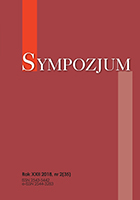Dlaczego (neo)gnostycyzm i (neo)pelagianizm to błąd? Najnowsze dokumenty Kościoła katolickiego (Gaudete et exultate, Placuit Deo) wobec zagrożeń dotyczących łaski i świętości
Why (neo)gnosticism and (neo)pelagianism is a mistake? Recent documents of the Catholic Church (Gaudete et exultate, Placuit Deo) towards the dangers regarding grace and sanctity
Author(s): Bartłomiej Krzysztof KrzychSubject(s): Christian Theology and Religion, Philosophy, Ethics / Practical Philosophy, Theology and Religion
Published by: Wyższe Seminarium Misyjne Księży Sercanów
Keywords: Francis; gnosticism; grace; pelagianism; posthumanism; spiritual threat; salvation;
Summary/Abstract: Modern Christians are exposed to many spiritual dangers that touch not only the content of faith, but also affect practice and daily life. It transfers into a misunderstanding of grace and sanctity and consequently of salvation, which is not sought in God, but in man or (secret) knowledge. Pope Francis calls these threats (neo)gnosticism and (neo)pelagianism. This article aims to discuss the latest documents of the Church, especially the apostolic exhortation Gaudete et exultate (April 2018) and the letter of the Congregation for the Doctrine of Faith Placuit Deo (February 2018). Analyzes are placed in a wider, philosophical context (posthumanism and postmodernity), which allows to properly understood and interpreted the presented phenomena – in respect to the magisterium of the Church.
Journal: Sympozjum
- Issue Year: 35/2018
- Issue No: 2
- Page Range: 267-283
- Page Count: 17
- Language: Polish

